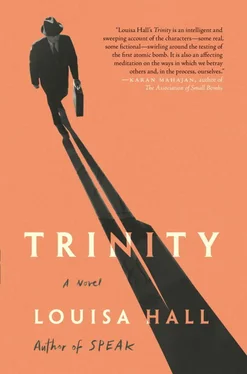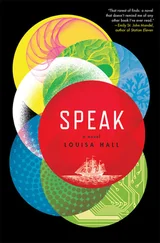It was almost past bearing, to think of returning to that nurse’s back office. Then I wondered where else I could go. Certainly not to the Shangri-la clinic, where though everyone did have such excellent health care, no one was providing that particular service.
And where, I thought, could I go? Where in the world would they help me?
Beside me, still rising, Jack lit a cigarette and contemplatively smoked it.
It’s a crazy world, he said, that we live in. Many millions already dead, and many millions still dying.
In one strike, he said, our weapon could incinerate a whole city. They won’t even have time to take shelter.
Just think, he said: The buzz of one plane overhead, a single silver belly in the blue sky, and suddenly the whole world will be burning.
Then he shook his head. He said all we can do is tend our own garden. And then he happened to mention that to that very end, he’d volunteered for a carnival thing the following weekend, a fair organized by the wives to raise funds for needy Los Alamos mothers.
Needy Los Alamos mothers!
My laugh, hearing that: it sounded like a rusty old gate swinging open.
It sounded like the caw of a usurer with her throat cut.
Hearing it, Jack stopped talking abruptly and looked at me with revulsion: to hear that rusty laugh, escaping the maw of a murdered old woman.
FROM WHERE I LEANED ON THE CENTRIFUGE, A MURDERED OLD USURERresting her bones, I watched Jack and that pretty girl dancing.
Then the song stopped, and the girl went off in one direction, and Jack went off in another. For a moment I wanted to find him, and tell him I was still living, but then I remembered that ghosts always act as if they’re still living, so I downed my beaker and looked up at the wife beater, who was still jabbering on, and though I’d long since lost the thread, I watched his face move and wondered whether this was indeed the face of a man who, in some former life, might have enjoyed humiliating his wife by causing her to feel completely defenseless.
For a moment, examining him, I felt something like caution. But I told myself I’d already been murdered, and dead women don’t need to be fearful, so then I asked the wife beater if he’d walk me back home. Then, for a while, we looked around for my coat, and only when I’d been safely swaddled did we head out together into the darkness.
IT WAS WITH AN ODD FEELING OF CALM, AS IF FLOATING JUST OVERmy head, that I watched myself walking home with the wife beater from explosives. Looking down, I noticed that my shoulders were thinner than they’d been last summer, when I played on the rocks by the water, wriggling my little brown body. But I’d cried too much since then, and lost weight all through the winter, and now I had the shoulders of a very old woman.
Then I saw that, though in keeping with his reputation he was somewhat burly, the wife beater in fact had very small hands. His wrists were almost touchingly slender, and somewhere off in the distance, he was telling me about his nine-year-old daughter: a girl, he said, who liked science and horses.
Listening to him droning on, I thought about June knitting that blanket. Then I remembered that blond girl with her braid and her exposed shoulders, and I thought: So many daughters.
So many daughters, I thought. And so many parents, though of course my own were now dead, my father, surprisingly, having gone first, and my mother having gone after.
Floating high overhead, I was barely listening while the wife beater talked, thinking instead about how, after my father’s death, I’d come home after that one year at Hunter, one glorious year I’d enjoyed very much. But after my father’s death I was needed at home to take care of my mother, who was still sick with the disease she got before they left Russia.
You never escape in this life, my mother once said, at least not once you start running. And that’s what I was thinking about while the wife beater talked. I was remembering what a careful and obedient girl I’d always been, because my mother was always so sick, and how for that one year at Hunter, I was set free.
For one whole year I was in love with my freedom, until I came home and my father had died, and I had only three months left with my mother.
In those final months, I washed her face. I brushed her hair back from her temples. I lay with her in the big bed, and I watched her while she slept, and sometimes, gripped by the fever dreams she was having, she whispered in Russian, and sometimes she whispered in Yiddish, and though I didn’t understand either language completely, I kept my eyes open and watched her lips moving.
And now here I was, a hundred million miles away, at a different altitude altogether, deep in the secret heart of the country she’d fled to, walking home with a man I didn’t know, past the Quonset huts and the clotheslines where people’s dresses and pants and shirts were hanging still, until a breeze came by and they seemed to be dancing.
And then, of course, I thought about Jack.
I thought about the substance of his body. I thought about how he never quite fully dried himself off after a shower. How, like an excitable little boy, he toweled himself off in a hurry, then rushed out with his neck still dripping wet and joined me in his bed, where we sat cross-legged and naked.
Through his bedroom window, you could hear owls. You could hear the rustling of the aspens, their leaves full of children.
You could smell the lake, glittering somewhere, and the fresh mud of the roads. That bedroom was like a tree house out of a book, and we were like kids, telling spooky stories at night, and giving each other the shivers, our skin so alert that the mere brush of a finger was like a stone slipping through the skin of the lake, sending rings widening over the water.
That’s what I was thinking about, walking home with the wife beater from explosives: that second childhood in Jack’s bedroom, which felt like my first, my own actual childhood having been spent speaking in whispers, never running, and trying so hard to live up to my end of the deals I made every night—the desires I said I’d forsake, the pleasures I’d live without—if only the world would leave me my mother.
And therefore what a wicked and keenly felt freedom it was, to be a child again in Jack’s arms, the world having already taken my mother.
That’s what I was considering, when the wife beater and I reached the WAC dorm, and he reached toward me and snaked his hand into mine, and from above I watched myself slow down and turn toward him, making it easier for him to lean forward and kiss me.
But then he simply gazed down at me fondly, and asked again if he could take me to dinner. And looking up at his hopeful face, I was flooded with such awful weariness of the whole thing—the girlish youth, the murdered old age—that I simply laughed, and asked if he wouldn’t prefer coming up to my dorm room.
“I think,” he said, stammering somewhat, “that I’d like to get to know you first.”
You’ll never know me, I thought.
Then I heard the call of an owl.
And then I remembered lying with my legs spread on that table in the nurse’s back office, and I wondered how interested the wife beater would be in getting to know me if that’s what I told him. Or if I told him I loved Jack so much that it killed me.
You don’t get to choose what you know, I thought, looking at the wife beater. And then the owl hooted again, and I felt I might get swept off into the darkness, so in a moment of desperation I grabbed the wife beater’s wrist and pulled him forward and forced him to kiss me.
LATER, ONCE HE’D UNDRESSED ME, I WAS INTERESTED TO DISCOVERthat, far from revealing the brutality he was rumored to possess, the wife beater was earnest and loving.
Читать дальше












